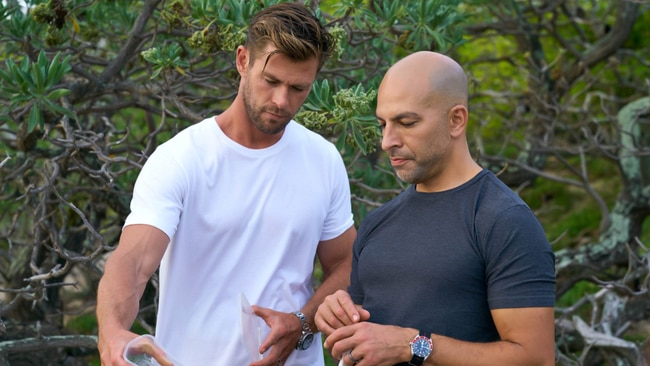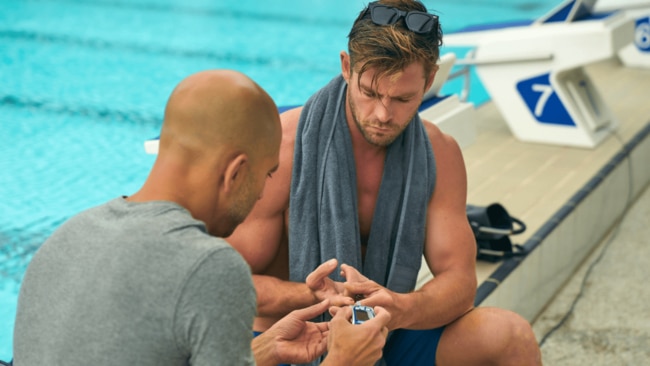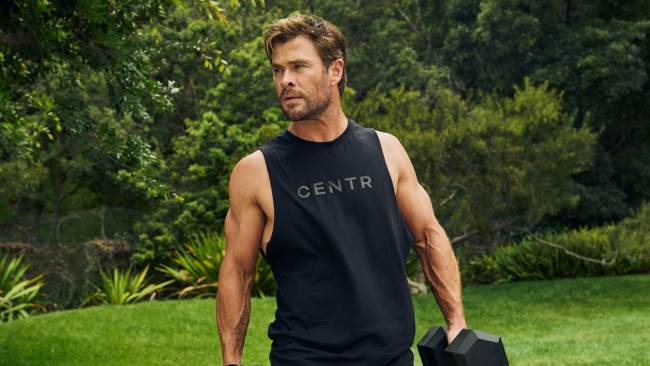How this doctor keeps celebrities looking - and feeling - younger for longer
Gwyneth and Chris have him on speed dial

Lifestyle
Don't miss out on the headlines from Lifestyle. Followed categories will be added to My News.
Chris Hemsworth, Gwyneth Paltrow and Elon Musk are just a few of the celebs who swear by Dr Peter Attia. Here’s what he believes we can all do to live a longer, stronger and healthier life.
Starting this weekend, I will be making a regular habit of an activity called ‘rucking’. You take a backpack, fill it with weights, then spend an hour or so briskly walking up and down hilly terrain. As well as being a great workout, doing this a few times a week will improve your spatial awareness and eccentric strength (the muscle’s force-producing capacity), both of which you need in order to walk down things like stairs, kerbs, slopes etc with stability and control.
I do not currently have a problem walking down stairs or stepping off pavements – I am 41 and in decent, although not exactly Olympian, shape– but I’m thinking of the future. For reasons we will explore, I’ve started thinking a lot more about the future, and how best to ensure my later years are as healthy as they can be. And one of the things I absolutely do not want to do when I’m older is have a fall. As such, I’m planning to minimise that possibility with some dumbbells in a backpack and one seriously big hill.
But that’s not all. I’m also going to make a concerted effort to increase both the quantity and quality of my sleep. So no more phone by the bed, no more waking up groggy after three weeknight pints, no more cheapo blinds that let the dawn light hit my face at 5am. I’m not going to worry too much about my weight, provided that I’madequately muscled. In fact, I now know it’s better to have a solid musculature and carry a bit more subcutaneous fat than you would like – which is to say, the fat beneath your skin – than to be perfectly slim but basically scrawny.
Like what you see? Sign up to our bodyandsoul.com.au newsletter for more stories like this.
Visceral fat, on the other hand? The fat that can form between and around your internal organs, and which is linked to increased risk of cancer and cardiovascular disease? I’m going to do everything I can to stem that stuff. I’m going to lift more weights and do more cardio, but, in terms of diet and dieting, I’m not going to put myself through anything that’s going to reduce my ability to go out and exercise on any given day.
So no long periods of fasting, no crash diets, nothing that’s going to leave me feeling too pooped to get my trainers on. Also, if I had a sauna, I’d use it at least four times a week for a minimum of 20 minutes per session, with the temperature set to 82 ̊C. The reason? Studies have suggested this may reduce the risk of Alzheimer’s by about 65 per cent. Only, I don’t have a sauna. But now I wish I did.
I have been inflicting this information and more – so much more– on everyone in my life over the past few days. This is because I have just read Outlive: The Science and Art of Longevity, written by a Canadian-American doctor called Peter Attia who specialises in the field of longer living. It’s a dense book, almost 500 pages, low on silver-bullet solutions –no claims about “hacking mortality” or how to extend your life with “this one trick!” – but high on stats and studies.
At Outlive’s core, Attia makes a straightforward proposition: almost all of us, regardless of our genes, can systematically do things to extend our lifespan. Better still, we can systematically do things to extend our ‘healthspan,’ to retain as many of our physical and cognitive faculties as possible as we enter the final furlong.
A quick example: Attia describes how, once you’re beyond the age of 65, breaking a hip can trigger a terminal decline in your health.
“There’s a 15 to 30 per cent chance of death in the next 12 months,” he says, frowning.“And, of those who don’t die, 50 per cent will never regain full function. It’s an awful statistic.”
This is why Attia goes rucking three times a week, and why he has persuaded me to do the same. Because if you can build and maintain good eccentric strength, your chances of falling and breaking a hip in your later years plummet.
So, who is Peter Attia?
Attia is 50, with a shaved head, a sonorous voice and a manner that tends towards seriousness. He has the trim, aggressively good posture of a personal trainer, but the fitted white shirt and reflexive hand gestures of an entrepreneur. Which, to a large extent, is what he is. For the past decade, Attia has run a private clinic with offices in New York and California, which specialises in helping patients extend their healthspan. (The cost? “Not cheap.”)
He hosts his own podcast, The Drive, which focuses on questions surrounding longevity and, with more than one million followers on social media, it would not bed is missive to describe him as a “health influencer.” He is big in the overlapping and occasionally nebulous online fields of wellness, performance and self-improvement.
He has celebrity followers: the actors Hugh Jackman and Chris Hemsworth are friends, Elon Musk recommends his articles on Twitter, Gwyneth Paltrow, Arnold Schwarzenegger and Oprah Winfrey have all recommended Outlive, which also happens to be, perhaps unsurprisingly, a US bestseller.
He lives in Austin, Texas, with his wife and three children. In his office, he has various items of Formula One racing memorabilia – a self-confessed perfectionist, he is entranced by the precision required to drive incredibly fast – and, on a wall, there is a calendar titled My Life in Weeks, composed of hundreds of tiny rectangles.
“I colour in one of the boxes every week,” he says. “I’m marching through the weeks of my life, and I can see I have fewer weeks left than I had. And that’s assuming I live for a long time.”
He smiles. Everybody wants more time on earth. So how did he become the world’s go-to guy for that very thing? To answer this, we have to understand that for a very long while, Attia didn’t even want to become a doctor. The child of Coptic Christian immigrants from Egypt, he grew up in Toronto where, during his teenage years, he hoped to become a boxer.
Instead, he ended up studying applied mathematics and mechanical engineering at Stanford, and was all set to start a PhD in aerospace engineering. During this time, Attia was volunteering at a shelter for teenagers who had been sexually abused.
“One day, I was visiting one of the young women who was part of this group in hospital. And I had an epiphany.”
Something about the visit made him abandon his aerospace ambitions and instead throw himself into medicine. He chose to specialise in surgery, and eventually found himself pulling 110-hour weeks at the prestigious Johns Hopkins Hospital in Baltimore as a young resident physician. It meant he was living and working in constant and intimate proximity to death and, he came to observe, it tended to come in one of two forms. There was ‘fast death’, which was sudden and violent.
“Most of it was gang-related – you know, gunshot wounds, stab wounds – but obviously motor vehicle accidents, as well,” he says. “Meaning these are people who yesterday were in perfect health, usually young people, and today they’re no longer here.”
‘Slow death’, on the other hand, involved caring for people who were suffering from chronic illnesses and conditions, from heart disease to cancer to diabetes.
“You would take care of patients for a long period of time, and get to know them and meet their family. And then ultimately realise that you had nothing left to offer them, that their disease was going to take their life, and nothing you could do surgically or medically was going to change that.”
Attia left medicine in 2006. He took a job at management consultancy firm, McKinsey, where, thanks to his background in maths, he ended up analysing credit risk for US banks. This sabbatical in a world of risk and data and metrics, however, got Attia thinking about how a more personalised, analytical and long-term approach to health might be applied. The birth of his first child in 2009 drew him deeper into the study of longevity.
“I wanted to maximise our time together,” he says. By 2012 he had returned to medicine, setting up his practice and starting in earnest down the path that would lead him to where he is today.
The simple new longevity mantra
But what, exactly, do we have to do to live longer? Much of Outlive serves as a manifesto for what Attia calls Medicine 3.0, which is, in essence, the aggressive prevention or delaying of the ‘four horsemen’.
The complicated part is that, to get the best out of this approach, Attia believes we should discover and monitor a raft of very specific things about our bodies and health: everything from your daily blood glucose levels to your visceral fat range, to your lipid profiles to your apolipoprotein E genome type.
It was Attia who broke the news to Hemsworth during the Disney+ series, Limitless, in which the Thor actor learnt about aspects of longevity, that he was genetically predisposed to Alzheimer’s and was around eight to 10 times more likely to develop the disease than the average person.
“If you look at Alzheimer’s prevention,” Hemsworth said afterwards, “the benefit of preventative steps is that it affects the rest of your life. When you have a predisposition to cardiovascular heart disease, cancer, anything, it’s all about sleep management, stress management, nutrition, movement, fitness. It’s the same kind of tools that need to be applied in a consistent way.”
Even if you’re not in a position – or don’t have the inclination – to undergo rafts of tests, Attia says there are still changes you can start making today. And perhaps the biggest one is psychological. Because if you want to extend your healthspan, the first thing you need to do is accept that, even if you are healthy now, you will inevitably decline and die.
This is not something most of us want to dwell on. I tell Attia that while I found Outlive interesting and informative, I also found myself feeling increasingly maudlin as I read it. Forcing myself to acknowledge this reality felt uncomfortable.
“It’s uncomfortable for me, as well,” he says. “But I do think, unfortunately, as the stoics teach us, a good life is a life that also has a very clear acknowledgment of death.”
At his clinic, Attia will ask his patients to make a list of the things they would like to be able to do in the final decade of their life, a period he calls the ‘marginal decade’ (a term he has trademarked). This can be anything from “stand up from a sitting position on the floor unaided” to “have sex”. It’s then a case of working backwards and figuring out what you need to be doing now in order to do those things then.
And Attia is very clear that, above all else, exercise is the thing most likely to extend your healthspan. Building and maintaining muscle strength via resistance training – weights, squats, push-ups etc – is likely to help you hit more of your marginal decade goals than anything else.
Diet, he says, is important. But really not as important as exercise. Attia tends to maximise protein and minimise carbs, based on what he’s found works for him.
“But most people who are very, very health-conscious I think are spending too much of their mental energy on nutrition and not enough on exercise. If you’re going to read my book and nitpick some details about the ratio of polyunsaturated fat, I have some advice for you: get outside and exercise.”
What about booze? It’s possible, if you read enough cheerful interviews with the very long-lived, to come away with the impression that they all enjoy regular glasses of wine, Scotch, whatever they fancy. And perhaps, therefore, drinking regularly isn’t such a bad thing? Attia shakes his head.
“I don’t think anybody disputes that ethanol is harmful,” although it’s possible that, in small amounts, there are nutritional and stress-busting benefits to, say, a glass of red wine that outweigh the harm. Attia says if he opens a bottle at home and doesn’t love the first sip, “I dump it down the sink and get another bottle. I’m not going to waste my drinks on crap. That’s why I don’t drink on planes. The alcohol is garbage.”
Attia writes at great length about the importance of sleep. Suffice to say, it’s just really, really important to pretty much every aspect of our health. Today, he makes sure he has eight hours of sleep, having previously been guilty of the classic entrepreneurial ‘rise and grind’ mindset.
“And I think that was only heightened by my medical training,” he says. “The mantra was, ‘I’ll sleep when I’m dead. I don’t need to waste my alive time doing it.’ Which, of course, was foolhardy. Because the more you short-change sleep, the more your health deteriorates.”

Attia's personal health epiphany
In fact, for a very long time, Attia was relentless. His ambition and drive seemed remarkable, from engineering at Stanford, to training as a surgeon, to working for McKinsey, to setting up his longevity practice, being tweeted by Musk and writing bestsellers while, for hobbies, racing cars and completing endurance swimming events. But he was also prone to anger and rage – at himself and at others – and liable to coldness to those around him.
In Outlive, he describes an incident in 2017 when, while he was away from home on a business trip to New York, his infant son almost died as a result of sudden cardiac arrest and had to be resuscitated by the family nanny. But rather than rush straight to the hospital where his son and traumatised wife were, he remained in New York, liaising with the doctors by phone but not curtailing his work trip.
In fact, he did not come home for another 10 days. The memory of this decision still leaves him feeling “nauseous” today. Despite being an almost perfect physical specimen, Attia was actually miserable and beset by a deep self-hatred.
“As was put to me by one of my therapists: ‘What’s the point in living longer if you’re not happy? It doesn’t make any sense.’”
Eventually, at the encouragement of a friend and the insistence of his wife, Attia checked into a residential treatment centre. And it was there that he told a roomful of strangers about how, as a young child, he had suffered sexual and physical abuse. This admission marked the start of a profound change in how he understood himself.
“I assumed my flaws were immutable. That they were coded into my DNA. Detachment. Resentment. Selfishness. Anger. Workaholism. Perfectionism. I assumed this was just who I was,” he says. “Especially when these are traits that go back to being a child. I just didn’t assume they could be changed.”
Attia is sharing all this because he now understands that, if we want to live well for as long as we’re able, we cannot afford to ignore our emotional health, and particularly the quality of the relationships that we have with others and ourselves.
“I think many of us accept misery as a human condition that we have no control over. And I don’t think that’s true. We actually do have a lot of control over it.”
One therapist explained to him that men often attempt to replace feelings of shame with feelings of grandiosity: to replace helplessness with heroism. I suppose it’s possible that offering people the means to a longer, healthier life could fall under this dynamic. Now, though, Attia is more balanced in his outlook. It used to be that if his kids baked cookies, he wouldn’t eat them on health grounds. Now he eats them, because eating cookies with your kids once in a while is, in the grand scheme of things, more important.
“If you were to ask me, ‘Peter, in the process of writing this book, what has changed most in your life?’ It’s not exercise. It’s not nutrition. It’s not sleep. It’s the emotional health.”
He says he hopes that, in time, his Medicine 3.0 ideas can be put into wider practice.
“I hear a lot from physicians who are on the front lines who say, ‘I love the way you’re talking about this. I wish I understood how to apply this within the current system that I must function in.’”
He hopes his own final years will be spent “living a very simple life in remarkable obscurity” somewhere quiet, with family and friends nearby, enjoying many of the things he does today. “But obviously, at a different level. I don’t have any delusions.”
Before we finish, I ask him if he’s happy. He frowns. “I think ‘happiness’ is a complicated word. I still struggle every day with the things I’ve always struggled with. But I have my priorities straight. I’m definitely living better today than I’ve ever lived,” he says. “But I hope to be living even better tomorrow.”
Originally published as How this doctor keeps celebrities looking - and feeling - younger for longer


